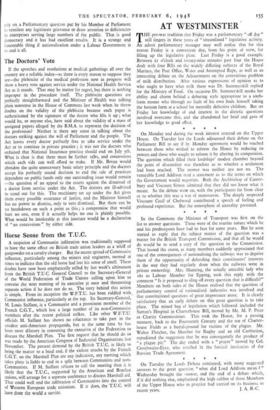The Doctors' Vote
If the speeches and resolutions at medical gatherings all over the country are a reliable index—as there is every reason to suppose they are—the plebiscite of the medical profession now in progress will show a heavy vote against service under the National Health Service Act as it stands. That may be matter for regret, but there is nothing improper in the procedure itself. The plebiscite questions are perfectly straightforward and the Minister of Health was talking plain nonsense in the House of Commons last week when he threw doubts on the validity of the plebiscite because each paper is authenticated by the signature of the doctor who fills it up ; what would he, or anyone else, have said about the validity of a mass of unsigned papers alleged by the B.M.A. to represent the decision of the profession? Neither is there any sense in talking about the doctors striking against the will of Parliament and the people. The Act leaves every doctor perfectly free to take service under the Act or to continue in private practice ; it was not the doctors who ordained that National Insurance practice should end on July 5th. What is clear is that there must be further talks, and concessions which each side can well afford to make. If Mr. Bevan would abandon the quite unnecessary basic salary principle and the doctors accept his perfectly sound decision to end the tale of practices dependent on public funds only one outstanding issue would remain —the question of an appeal to the courts against the dismissal of a doctor from service under the Act. The doctors are ill-advised to stand out for this. The machinery set up under the Act gives them every possible assurance of justice, and the Minister himself has no power to dismiss, only to veto dismissal. But there can be no breakdown on such a point as this ; a compromise that would hurt no one, even if it actually helps no one is plainly possible. What would be intolerable at this juncture would be a declaration of " no concessions " by either side.






























 Previous page
Previous page